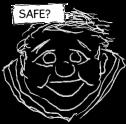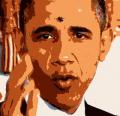Scholar on Constitutional Dismantling
Oh, but Barry Soetero is a student of the Constitution, though. He has studied it in a manner different from how you and I might, however. Sort-of the way the 2001 Sep 11 terrorists studied the World Trade Center towers.
"The Constitution … had flaws. Flaws that this nation strove to protect [sic] over time. Questions of race and gender were unresolved. No women's signature graced the original document. Although we can assume there were Founding Mothers, whispering things in the ears of the Founding Fathers. [cheers, applause] …
"What made this document special was that it provided the space, the possibility, for those who had been left out of our charter to fight their way in. It provided people the language to appeal to principles and ideals that broadened Democracy's reach. It allowed for protest. And movements. And dissemination of new ideas that would repeatedly, decade after decade, change the world. Constant forward movement that continues to this day. Our Founders understood that America does not stand still. We are dynamic, not static. We look forward, not back."
Now, you don't get any more Constitutionally scholarly than that.
It's not about creating a government of checks and balances, limited in its scope, and protecting a self-governing people from institutional excesses. It's not about upholding law and providing stability. Not for Barry. No, government is all about moving forward and being dynamic and broadening Democracy's reach, which obviously means including the whole world in the American umbrella, so open the borders and let everybody vote!
September 2001 Chicago public radio program
“Barack Obama, what are your thoughts on the Declaration and Constitution?”
“I-I-I think it’s a remarkable document –“ he began haltingly.
“Which one?” Helfrich interjected.
“The original Constitution as well as the Civil War Amendments,” he replied. “But I think it is an imperfect document, and I think it is a document that reflects some deep flaws in American culture, the Colonial culture nascent at that time.
“African-Americans were not -- first of all they weren’t African-Americans -- the Africans at the time were not considered as part of the polity that was of concern to the Framers. I think that as Richard said it was a ‘nagging problem’ in the same way that these days we might think of environmental issues, or some other problem where you have to balance cost-benefits, as opposed to seeing it as a moral problem involving persons of moral worth.
“And in that sense,” Obama continued, “I think we can say that the Constitution reflected an enormous blind spot in this culture that carries on until this day, and that the Framers had that same blind spot. I don’t think the two views are contradictory, to say that it was a remarkable political document that paved the way for where we are now, and to say that it also reflected the fundamental flaw of this country that continues to this day.”
Obama did not elaborate on the “fundamental flaw” that persists.
I'll stop there. Two-link limit. ![]()


